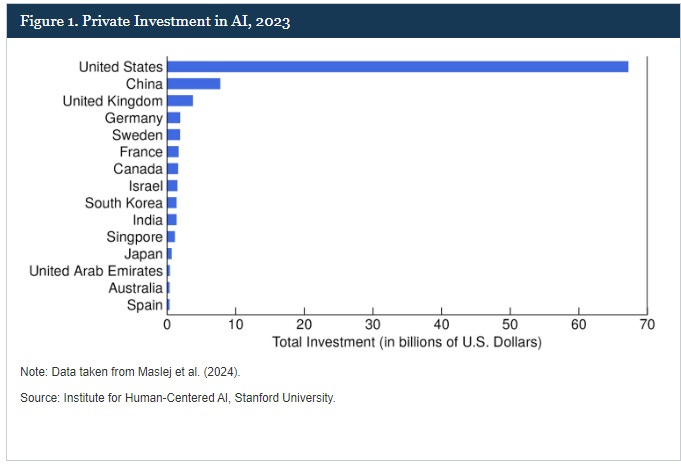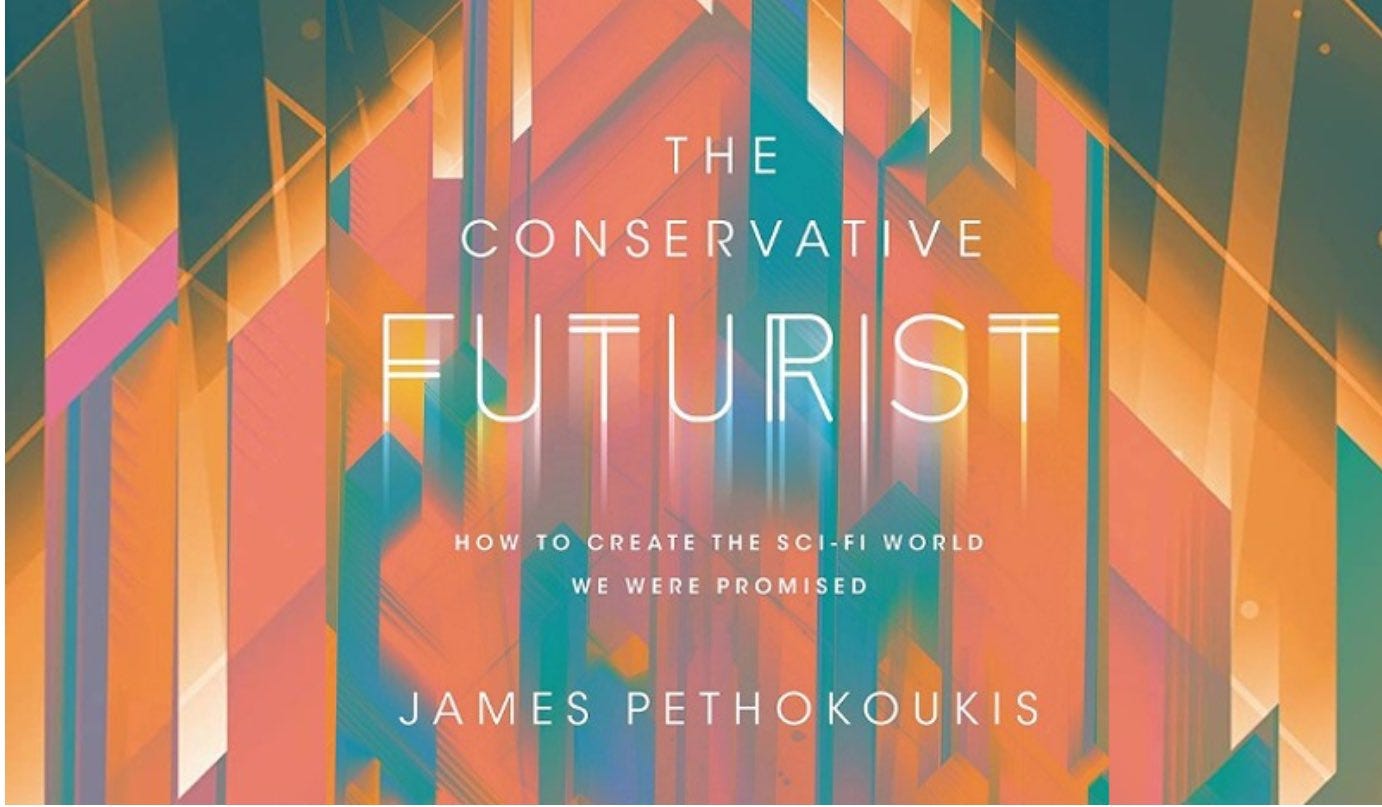📈 This was a good US GDP report!
📺 Thursday Throwback: The thrilling pro-progress message of the 2012 London Olympic Games
Stick with me here: If we were (fingers crossed) entering a sustained period of faster productivity growth — my Faster, Please! dream — one would expect to see some surprisingly strong GDP reports. After all, we’ve been stuck in a productivity rut since before the Global Financial Crisis, a situation that most economists — including those at the Congressional Budget Office and Federal Reserve, and on Wall Street — assume will continue (as seen in their long-term forecasts.
A productivity surge, however, would translate into unexpectedly strong economic growth … such as we saw in today’s second-quarter GDP report. The American economy grew faster than expected during those three months, with real GDP increasing at an annual rate of 2.8 percent. The economy's performance in this quarter was significantly better than the first quarter's 1.4 percent growth and exceeded economists' predictions of 2.1 percent.
The details are even more encouraging, according to Joseph Brusuelas, chief economist at RSM:
… the composition of growth was tilted towards productivity and rock-solid private sector and household economic activity. The best aspect of the second quarter report was the large advance in productivity-enhancing investment. Outlays on equipment advanced 11.6% and spending on intellectual property increased 4.5% which affirms our conjecture that the American economy is in the midst of a productivity boom that in turn will result in an improved standard of living across the economy for all cohorts.
Accelerating economic growth (with AI- and chip-related spending a tailwind) plus a cooling labor market suggests that Q2 productivity growth should be pretty strong. Recall: Q1 was a nothingburger 0.2 percent, but that came after three consecutive strong quarters of 3.3 percent (Q2 2023), 4.6 percent (Q3 2023), and 3.5 percent (Q4 2023). This from MarketWatch:
The details of the second quarter GDP report indicate that labor productivity picked up in the quarter, said Brian Bethune, an economist at Boston College. Bethune estimates that productivity increased an estimated 1.5%-2% in the second quarter, up from a 0.2% gain in the first three months of the year. … Bethune detects a pickup in productivity in the post-pandemic economy. He estimates that productivity is running at about a 1.8% rate since the first quarter of 2020. That's up from a 1.1% rate from 2005-2019. Higher productivity is the secret sauce of the economy as it is a path for higher standard of living for workers.
Along those lines, it’s worth highlighting “Global Implications of Brighter U.S. Productivity Prospects,” a new report from Federal Reserve economists Danilo Cascaldi-Garcia and Hyunseung Oh. Their model identifies “news shocks” as anticipations of future productivity gains, in the form of current investment and stock prices. Recent data shows plenty of positive news shocks, likely due to AI expectations, though not matching the 1990s IT boom. The key insight: Expected future productivity improvements influence present investment decisions and market valuations before actual gains occur. From their note:
The above analysis suggests that the recent AI boom is consistent with some optimism about future growth in U.S. productivity. However, it is still too early to say that the U.S. will indeed experience a boost in productivity like in the late 1990s and early 2000s following the IT boom period.
More good news to come? Perhaps, and it will take lots more good news and good data points — productivity numbers are notoriously jumpy, by the way — before those forecasts get an Up Wing upgrade.
The Conservative Futurist: How To Create the Sci-Fi World We Were Promised
“There’s a lot of interest in Ezra Klein and Derek Thompson’s forthcoming book on “abundance,” which they hope to make the centerpiece of a new moderate Democrat economic agenda. And there’s a conservative version of this in almost the opposite of the Vance corner of the board, exemplified by James Pethokoukis’ recent book “The Conservative Futurist.” That book, which rejects MAGA nostalgia economics, posits that the most important divide in contemporary American politics is not between right-wing and left-wing but between pro-growth “up-wing” optimists and “down-wing” doomers. I like Ezra and Derek, and I like Pethokoukis’ book.” - Matthew Yglesias
📺 Thursday Throwback: The thrilling pro-progress message of the 2012 London Olympic Games
(This mini-essay was first published on April 12, 2021)
“We may be a small country, but we're a great one, too,” says the British prime minister (portrayed by Hugh Grant) in the 2003 film Love Actually. “The country of Shakespeare, Churchill, the Beatles, Sean Connery, Harry Potter. David Beckham's right foot. David Beckham's left foot, come to that.”
All true. And it would’ve been no vain boast had the PM added, “It was Britain that made the modern world.” The achievements of the Industrial Enlightenment and Revolution were not forgotten by Oscar-winning director Danny Boyle when he put together the glorious opening of the 2012 Summer Olympics in London. The ceremonies begin with the “Green and Pleasant Land” segment — depicting idyllic rural life — before suddenly shifting to “Pandemonium” with its propulsive drums and now iconic visuals of seven coal-smoke belching chimney stacks rising from green fields. Then come the machinery of this revolution, including steam engines and looms, tended by grimy workers and overseen by top-hatted capitalists (led by actor Kenneth Branagh), all performing rhythmically as if machines themselves. William Blake’s dark Satanic mills on full display.
But the story doesn’t end there. The workers have been casting iron rings, the famous Olympic rings, which are eventually hoisted over the stadium where they rain down silver and gold sparks. And it is that image of the glowing rings, ignited as much by the spirit of the age as molten iron, that appeared on the front pages of newspapers around the world nearly a decade ago.
Here’s how Boyle thought about the segment: “We call it Pandemonium, which is Milton’s invented word for the capital of hell in Paradise Lost, and you know all the stories about Victorian Britain, but it also unleashed tremendous potential, and the growth of cities and the growth of a working base was extraordinary really, and it has changed all our lives. It has certainly allowed me to be here.” Indeed, at the end of the segment, a BBC television presenter said the scene was more like “paradise found.”
Those ceremonies are often considered the best in Olympic history. I would agree, but as much for the aspirational message as the evocative presentation.
Micro Reads
▶ Business/ Economics
OpenAI Is Launching Search Engine, Taking Direct Aim at Google - WSJ
What Gives Poor Kids a Shot at Better Lives? Economists Find an Unexpected Answer - WSJ
Reverse Brain Drain? Exploring Trends among Chinese Scientists in the U.S. - Stanford
▶ Policy/Politics
▶ AI/Digital
The problem of ‘model collapse’: how a lack of human data limits AI progress - FT
Who will control the future of AI? - Sam Altman
▶ Biotech/Health
Evidence mounts that shingles vaccines protect against dementia - NewSci
If We Want to Settle Other Planets, We'll Need to Edit Our DNA - RSC
▶ Clean Energy/Climate
Why the US is still trying to make mirror-magnified solar energy work - MTR
US solar production soars by 25 percent in just one year - Ars
▶ Robotics/AVs
▶ Space/Transportation
No, NASA hasn’t found life on Mars yet, but the latest discovery is intriguing - Ars
India budget: Modi bets big on nuclear energy and space - Nature









4% should be the goal. Real growth. Every quarter.
Wait for the revised figures...